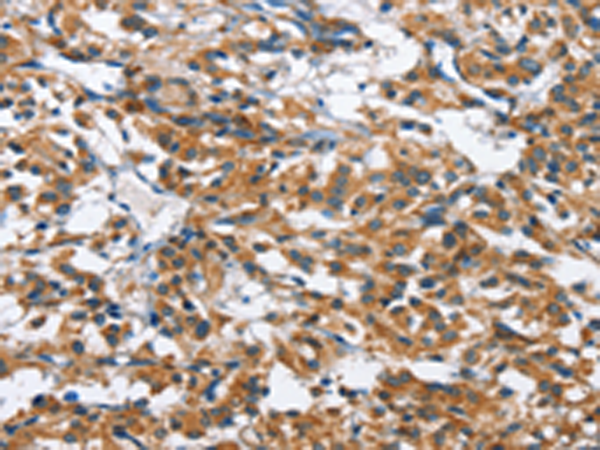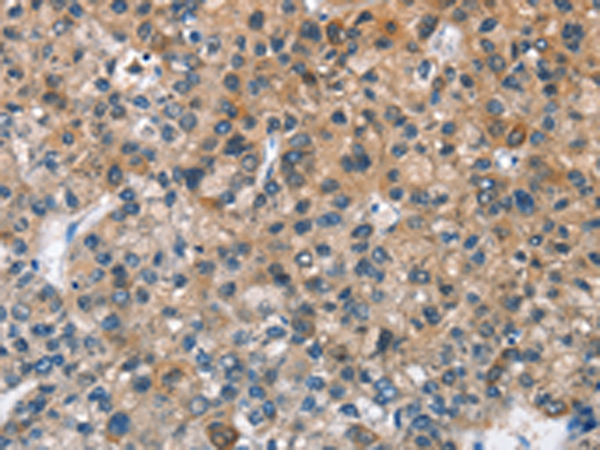

| WB | 咨询技术 | Human,Mouse,Rat |
| IF | 咨询技术 | Human,Mouse,Rat |
| IHC | 1/50-1/200 | Human,Mouse,Rat |
| ICC | 技术咨询 | Human,Mouse,Rat |
| FCM | 咨询技术 | Human,Mouse,Rat |
| Elisa | 1/1000-1/5000 | Human,Mouse,Rat |
| Aliases | rBPI; BPIFD1 |
| Host/Isotype | Rabbit IgG |
| Antibody Type | Primary antibody |
| Storage | Store at 4°C short term. Aliquot and store at -20°C long term. Avoid freeze/thaw cycles. |
| Species Reactivity | Human |
| Immunogen | Fusion protein of human BPI |
| Formulation | Purified antibody in PBS with 0.05% sodium azide and 50% glycerol. |
+ +
以下是关于BPI(杀菌/通透性增加蛋白)抗体的3篇代表性文献概览:
---
1. **文献名称**:*Anti-BPI antibodies in cystic fibrosis: a systematic review*
**作者**:Carlsson M, et al.
**摘要**:该综述分析了囊性纤维化(CF)患者中抗BPI抗体的临床意义,发现高滴度抗BPI抗体与更严重的肺部炎症和肺功能下降相关,提示其可能作为疾病进展的生物标志物。
---
2. **文献名称**:*Autoantibodies against bactericidal/permeability-increasing protein in patients with cystic fibrosis and chronic inflammatory lung disease*
**作者**:Schultz H, et al.
**摘要**:研究发现,抗BPI抗体在囊性纤维化和慢性肺部炎症患者中显著升高,且与铜绿假单胞菌感染相关,表明病原体可能通过分子模拟机制触发自身免疫反应。
---
3. **文献名称**:*The role of anti-neutrophil cytoplasmic antibodies (ANCA) in vasculitis: focus on anti-BPI antibodies*
**作者**:Zhao MH, et al.
**摘要**:本文探讨了抗BPI抗体在ANCA相关血管炎中的潜在作用,发现其与疾病活动性和肾脏损伤相关,提示其在诊断和预后评估中的临床应用价值。
---
以上文献聚焦于抗BPI抗体在感染、自身免疫疾病(如血管炎)及慢性炎症中的病理机制及临床意义,可作为相关研究的参考基础。如需具体文献链接或补充更多研究,可进一步说明。
**Background of BPI Antibodies**
Bactericidal/Permeability-Increasing Protein (BPI) is a 45-55 kDa cationic antimicrobial protein primarily produced by neutrophils and epithelial cells. It plays a critical role in innate immunity by neutralizing gram-negative bacteria through binding to lipopolysaccharides (LPS), disrupting membrane integrity, and promoting bacterial clearance. BPI also modulates inflammatory responses by sequestering endotoxins, thereby reducing LPS-induced immune activation.
BPI antibodies, including autoantibodies against BPI, have gained attention in autoimmune and chronic inflammatory conditions. In autoimmune diseases, such as anti-neutrophil cytoplasmic antibody (ANCA)-associated vasculitis, anti-BPI antibodies are detected in a subset of patients, particularly those with granulomatosis with polyangiitis (GPA). These antibodies may impair BPI’s bactericidal function, potentially exacerbating infections or inflammation. Notably, anti-BPI antibodies are also linked to cystic fibrosis (CF), where chronic bacterial colonization (e.g., *Pseudomonas aeruginosa*) may trigger their production, contributing to persistent lung damage.
Clinically, anti-BPI antibodies are measured via ELISA or immunoassays, though their diagnostic utility remains debated due to variable prevalence across diseases. Research suggests they may serve as biomarkers for disease progression or infection risk in specific cohorts. However, their pathogenic role—whether directly damaging or epiphenomenal—requires further elucidation. Understanding BPI-antibody interactions could inform therapeutic strategies, such as targeting BPI pathways or modulating antibody production in chronic inflammatory states.
×